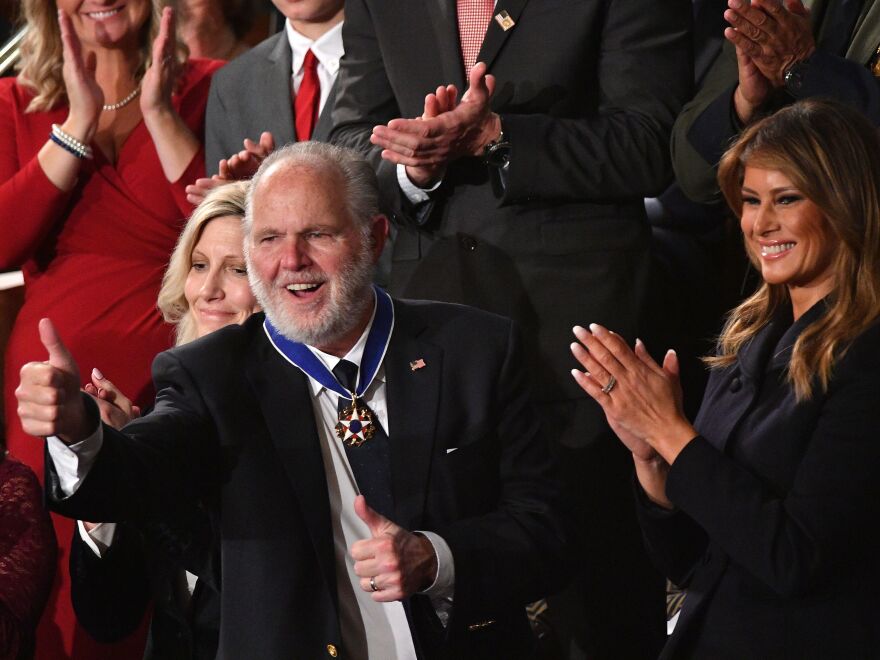President Trump took full advantage of the large television audience for his State of the Union speech on Tuesday to make his case for reelection in November, touting the strong economy and delighting Republicans in the room with a series of made-for-TV moments.
But his address also laid bare his bitter partisan standoff with Democrats and left little doubt that legislative accomplishments between now and the election will be difficult, if not impossible.
Before declaring that "the state of our union is stronger than ever before," Trump appeared to snub Democratic House Speaker Nancy Pelosi, turning away as she reached out to shake his hand after he handed her a copy of his remarks.
After Trump finished speaking, as Republicans cheered, she theatrically tore her copy of the address in half. Later, on Twitter, Pelosi called the speech a "manifesto of mistruths."
Speaker Pelosi just ripped up:
— The White House 45 Archived (@WhiteHouse45) February 5, 2020
One of our last surviving Tuskegee Airmen.
The survival of a child born at 21 weeks.
The mourning families of Rocky Jones and Kayla Mueller.
A service member's reunion with his family.
That's her legacy.
Trump made no mention of his impeachment, the hearings and trial that have riveted Washington for months, even as House impeachment managers sat together in a row before him. Neither did Michigan Gov. Gretchen Whitmer, who delivered the Democratic response. Trump also made no overt mention of the 2020 election, though Republicans did chant "Four more years!" as Trump entered the chamber.

The address hit many of the same themes that are staples in Trump's arena rally speeches — celebrating his record on job creation and increased defense spending, and warnings about immigration — but without some of the vitriol that thrills his supporters.
Trump went on the attack on the top election issue of health care, labeling Democrats who support universal health care "socialists."
One hundred thirty-two lawmakers in this room have endorsed legislation to impose a socialist takeover of our health care system, wiping out the private health insurance plans of 180 million Americans. To those watching at home tonight, I want you to know: We will never let socialism destroy American healthcare!
He called on Congress to pass legislation to lower prescription drug prices — a big issue for voters — mentioning a Senate bill proposed by Iowa Republican Chuck Grassley but opposed by Senate Majority Leader Mitch McConnell. In return, House Democrats chanted "HR 3!" — the name of a sweeping bill on drug prices passed by the House in December that's unlikely to move in the Senate.
There were a few moments in Trump's speech that yielded applause from both Democrats and Republicans, such as when Trump hailed Venezuelan opposition leader Juan Guaidó in the House gallery, a signal of bipartisan support for Guaidó and his efforts to restore democracy in Venezuela.

Again and again in his speech, Trump talked about policies aimed at black Americans: his support for historically black colleges, school vouchers and "opportunity zone" tax breaks for investment in designated low-income neighborhoods. His campaign is making a push to secure more votes from African Americans, to nudge support higher than the 8% he got in 2016 in key swing states where it could make a difference.
It's an uphill battle. A recent Washington Post-Ipsos poll found that 8 in 10 black Americans say they believe Trump is "a racist," and 9 in 10 disapprove of his job performance.
One of Trump's most reality-show-inspired moments underscored the challenge he faces with African American voters. In the middle of his address, Trump gave the nation's highest civilian honor, the Presidential Medal of Freedom, to Rush Limbaugh, a conservative talk radio host whom many African Americans view with suspicion because of his past comments on race, including disparaging remarks about former President Barack Obama.
An emotional Limbaugh, who this week announced he has been diagnosed with advanced lung cancer, stood and rubbed his eyes as first lady Melania Trump fixed the medal around his neck. Republicans stood and cheered, and Democrats stayed seated.
Copyright 2021 NPR. To see more, visit https://www.npr.org.









